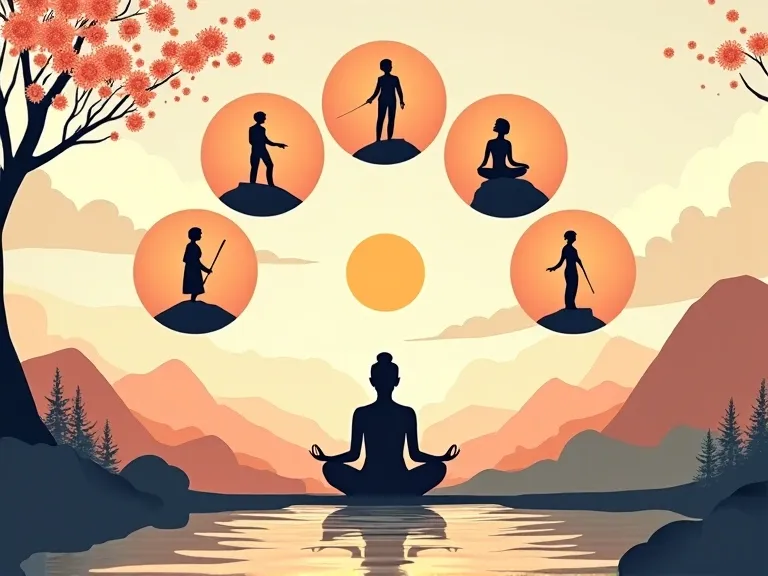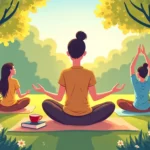In the thicket of daily duties, constant notifications and challenges of the modern world, more and more people are asking themselves the same question: “What’s it all for?” A sense of disorientation and lack of direction – despite the apparent abundance of possibilities – is becoming an epidemic of our times. The Japanese, a nation renowned for their longevity and balance, have been cultivating a concept for centuries that can be an antidote to our existential dilemmas… They call it Ikigai – the art of finding what makes it worth getting up every morning.
Have you ever wondered what it would be like to wake up with a sense of deep meaning and fulfillment? Ikigai is not just another trendy philosophy—it’s a practical path to a balanced life that connects what you love, what you’re good at, what the world needs, and what you can get paid for. In this article, we’ll share five transformative steps—developed by generations of Okinawans—that will help you discover your own Ikigai and find harmony between your work, passions, and daily rituals. Whether you’re feeling burnt out or simply looking for deeper fulfillment…
The origin and meaning of the concept of Ikigai
Ikigai, this precious Japanese concept, originating from the culture of Okinawans – a region famous for the extraordinary longevity of its inhabitants. It consists of two words: “iki” (life) and “gai” (value, meaning), creating a concept that can be translated as “a reason to get up in the morning.” Fascinating, how a simple word can carry such profound wisdom for life.
In Japanese tradition, ikigai is not just a philosophical idea, but a practical guide for everyday life. The inhabitants of the Land of the Rising Sun see it as a point of balance between four key areas: what you love, what you are good at, what you can get paid for, and what the world needs. Finding this harmony brings an inexpressible joy of existence.
Modern research confirms that people who live according to the principles of ikigai enjoy better mental and physical health. Scientists have found that Okinawans who cultivate this philosophy are less likely to suffer from heart disease, depression and dementia. Their vitality stems from a deep conviction of their own usefulness and the meaning of their actions. It is undoubtedly inspiring how a simple philosophy can bring such tangible benefits.
In the Western world, ikigai is gaining popularity as an antidote to modern ills – rushing, burnout and a sense of emptiness. People are looking for their inner guide that will allow them to find peace of mind in the chaos of everyday life. Livestock – as people practicing ikigai could be called – remind us that life does not have to be a race, but rather a conscious journey towards fulfillment.
Finding your own ikigai is a process, not a one-time revelation. It requires careful introspection, experimenting with different activities, and patience. The Japanese believe that every person has their own unique ikigai, waiting to be discovered. True happiness is found by those who have the courage to listen to the voice of their own heart and follow it, even when the path seems unclear. It is amazing how a simple philosophy can change an entire life.
The four pillars of Ikigai: passion, mission, profession and vocation
Ikigai can be compared to an extremely precise compass that, instead of cardinal directions, indicates four key dimensions of our lives. Have you ever wondered why some people wake up every morning with energy and enthusiasm while others struggle with a feeling of emptiness? The secret lies in the harmonious combination of four pillars: passion (what you love), mission (what the world needs), profession (what you can get paid for), and vocation (what you are good at).
Imagine Ikigai as a perfectly balanced Japanese Zen garden, where every element has its place and purpose. Passion is the blooming flowers that add color and beauty to life. Mission is like the water that irrigates not only your garden but also the surrounding areas. Profession is the solid stones that create paths and foundations, providing stability. And vocation is like the precise cuts of a bonsai – the ability to shape reality according to your unique talent. Can you see how these elements work together in your life?
When all four pillars meet at one point, we experience full Ikigai – a state of deep fulfillment and meaning. It is like discovering the center of a labyrinth after a long journey full of twists and turns and dead ends. The Japanese believe that finding this center is a process, not a one-time event. It requires patience, self-awareness and the courage to ask yourself difficult questions. What activities make you lose track of time? What could you do even if no one paid you for it? In what situations do you feel that your skills are truly serving others? The answers to these questions lead us closer and closer to our unique Ikigai.
Practical application of Ikigai in everyday life
Implementing Ikigai philosophy starts with deep reflection on four fundamental questions: what do you love to do, what are you good at, what the world can pay you for, and what the world needs. The real magic happens at the intersection of these areas. Regular practice involves creating small, daily rituals that gradually lead to discovering your own “reason to get up in the morning.” This could be a morning meditation, a walk in nature, or time spent developing a skill that you are passionate about.
Life without Ikigai is like sailing without a compass – you can be on the move, but you will never reach the right port.
The Okinawans, known for their longevity, practically apply the principles of Ikigai by moderation in everything – from eating (the principle of hara hachi bu – eating until 80% satiety) to physical activity. However, an equally important aspect is constant learning and being an active member of the community. Studies show that people living in accordance with their own Ikigai experience less stress, depression and burnout, and their immune system works better.
Finding your Ikigai is not a one-time event, but a lifelong process.
Health aspects of the Ikigai philosophy
The Ikigai philosophy, which comes from Japanese tradition, has numerous health benefits that confirm the centuries-old wisdom of the Okinawans. Longevity of the Japanese from this region is not accidental – it results directly from implementing the principles of Ikigai in everyday life. Scientific research shows that people guided by this philosophy are less likely to suffer from lifestyle diseases such as hypertension or type 2 diabetes.
The holistic approach of Ikigai supports physical health by promoting moderate but regular physical activity. Hara hachi bu – the principle of only filling the stomach by 80% – helps maintain a healthy body weight and supports metabolism. The balance between activity and rest, which Ikigai emphasizes, is crucial for the body's homeostasis and the proper functioning of the immune system.
Equally important is the impact of Ikigai on mental health. Finding your reason to get up every morning reduces the risk of depression and anxiety. Ikigai teaches patience with yourself and the world. Ikigai promotes mindfulness and presence in the moment. Ikigai encourages celebrating small joys, which increases the level of endorphins – happiness hormones. Japanese geriatricians emphasize that patients with a strong sense of Ikigai show greater mental resilience and cope better with the health challenges of old age.
"Ikigai is not about an intense search for happiness, but about practicing every day what gives meaning to life and at the same time enhances our vitality" - Dr. Yasuhiro Miki, gerontologist
Building social relationships according to the Ikigai concept
In the Japanese philosophy of Ikigai, social relationships are one of the fundamental pillars of well-being and a sense of meaning in life. Building interpersonal relationships begins with ordinary interactions, By meaningful conversations, until deep friendships i lasting communities based on mutual support. The Japanese from Okinawa, a region famous for the longevity of its inhabitants, show that it is strong social relationships that contribute to their vitality and life satisfaction.
According to the concept of Ikigai, harmonious relationships with others help us find a balance between what we love, what we are good at, what the world needs and what we can be rewarded for. Sharing passions, inspiring each other and celebrating successes together strengthens the sense of belonging that is essential for human happiness. As the Japanese proverb says: “No road is long with a good friend by your side”.
In the future, as social life becomes increasingly digital, the concept of Ikigai is likely to gain importance as a counterweight to virtual interactions. Traditional Japanese approaches to building bonds can inspire new forms of community that combine technology with authentic human contact. Growing awareness of mental health may lead Western societies to turn more to Eastern philosophies as a remedy for loneliness and alienation. Ikigai, with its emphasis on social relationships, can become a key element in designing urban spaces, educational programs, and social policies that support authentic connections between people.
Ikigai and the Longevity of Okinawans
On the Japanese island of Okinawa, where residents live to extraordinary old age, Ikigai is the foundation of everyday life. This profound concept, which is difficult to fully translate without understanding Japanese culture, combines the meaning of existence, the reason to get up every morning and the joy of simple but deeply satisfying activities. The inhabitants of this island do not retire in our Western sense – they remain active, engaged and socially needed until old age.
Scientists studying the phenomenon of Okinawan longevity have discovered a fascinating relationship between the practice of ikigai and physical and mental health. Daily physical activity, moderate eating and a deep sense of belonging to a community are the pillars of this lifestyle. Importantly, depression among the elderly is almost non-existent in Okinawa, which contrasts dramatically with data from Western countries, where loneliness and a sense of uselessness become increasingly common with age.
“Don’t ask what the world needs. Ask what makes you feel alive, and then go and do it. Because what the world needs are people who feel alive.” – This idea perfectly reflects the essence of ikigai practiced by the centenarians of Okinawa.
To summarize the key aspects of ikigai in the context of Okinawan longevity:
- ✅ Regular, moderate physical activity throughout life – gardening, walking, tai chi
- ✅ A diet rich in vegetables, seafood and natural products
- ✅ Strong social and family ties to prevent isolation
- ⚡ Okinawa has five times more centenarians than the rest of the world
- ❌ Modern globalization and westernization threaten traditional lifestyles
How to discover your own Ikigai – practical tips
“What if you could discover your true purpose in life tomorrow?” This question rang in my head during a visit to the small village of Ogimi in Okinawa, where I met 103-year-old Kimiko, who rises at dawn every morning to tend her garden. Her ikigai – the reason she gets out of bed every day – was so obvious in her every movement, smile and word.
Discovering your ikigai is a process that requires deep self-reflection. Start by asking yourself four key questions: What do you love to do? What are you good at? What would the world pay you to do? What does the world need? The place where these four areas intersect is your ikigai. Write your answers in a journal for a few weeks, and see what patterns emerge.
Another practical step is experimenting with different activities. Don't sit and think - act! Sign up for a course that has always intrigued you, volunteer in an area that moves you, or start a personal project. In our actions we often discover passions that we didn't even know existed.. The people of Okinawa, the region with the highest number of centenarians in the world, are constantly taking on new challenges, regardless of age.
It is equally important to listen to your body and emotions. Notice the moments when you lose track of time, when you feel a surge of energy and joy. These moments of “flow” are clues to your ikigai. At the same time, remember that ikigai is not just about career – for many Japanese, their reason for living is connected to simple pleasures, family relationships, or serving the community.
Ultimately, discovering your ikigai is not a one-time event, but an ongoing journey. The Japanese believe that ikigai evolves with us throughout our lives. Be patient and open to change. Remember that the most important thing is not so much the discovery itself, but cultivating your ikigai every day through small, consistent actions that give life deeper meaning and satisfaction.
In Search of Your Own Ikigai – The Path to a Fulfilled Life
The Japanese concept of Ikigai offers us much more than just a philosophical idea – it is a practical roadmap to a deeply satisfying life. Finding a balance between passion, mission, profession and calling can fundamentally change our daily experiences, giving them deeper meaning and joy.
It is not about great revolutions, but about conscious daily choices – a healthy diet without overeating, regular physical activity, nurturing interpersonal relationships and systematic development of interests. It is in this everyday life, freed from rush, that the secret of longevity and fulfillment lies.
If I could speak as the concept of Ikigai itself, I would say, “I am not something you have to discover far outside of yourself. I already exist in your heart—in the moments when you lose track of time doing what you love; when you feel your work matters; when you serve others and receive recognition for it. I just need you to slow down and start noticing me.”
Start your journey to Ikigai today:
- Ask yourself: what do I really love to do?
- Think about what you are good at and what the world needs.
- Introduce one small, healthy habit into your daily routine.
- Spend at least 15 minutes a day developing your passion.
Frequently asked questions
What exactly is Japanese Ikigai?
Ikigai is a Japanese concept meaning “reason for living” or “meaning of life.” It is the balance between what you love, what you are good at, what you can get paid for, and what the world needs. At its core, Ikigai is a daily practice that brings purpose and joy to life, not a one-time epiphany.
How to start discovering your Ikigai?
Begin by reflecting on yourself and writing down the answers to four key questions: what do you love to do, what are you good at, what would people pay you to do, and what does the world need? Then, regularly spend time looking at the common ground between these areas. Practice in small steps, adding things that bring you joy to your daily routine. In ancient times, the Japanese called this process “michi-sagashi”—finding the way.
Does finding Ikigai require major life changes?
Not necessarily. Contrary to popular belief, Ikigai is often found in small, everyday activities and does not require radical changes. It can be developing an existing hobby, introducing new rituals or deepening relationships with loved ones. The Japanese believe that Ikigai can be found in simplicity and mindfulness of what we already have in life.
How long does it take to find your own Ikigai?
Finding your Ikigai is a process, not a goal in itself. Some people will discover elements of their Ikigai in a few weeks, for others it may be a journey of many years. It is important to remember that your Ikigai evolves with you – what gave you meaning at one point in your life may change. The Japanese talk about “kaizen” – continuous improvement, which also applies to our understanding of our own meaning in life.
Does Ikigai have to be connected to work?
This is not necessary. Although Western interpretations of Ikigai often emphasize the professional aspect, in the traditional Japanese sense, Ikigai can be completely unrelated to work. For many Japanese, especially Okinawan seniors, Ikigai means tending a garden, meeting friends, or caring for grandchildren. It is any activity that makes it “worth getting out of bed.”







